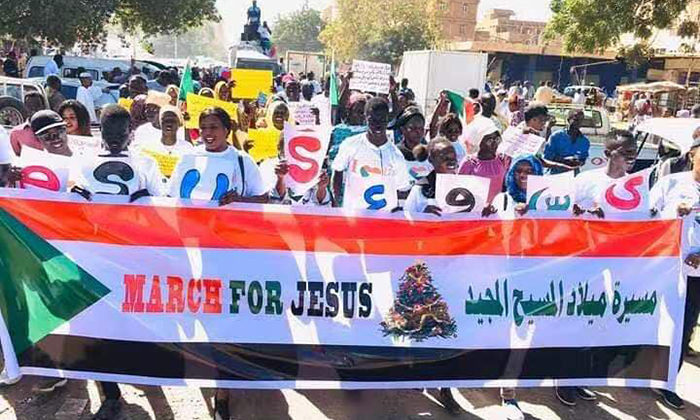
Christians on the streets of Khartoum marching for Jesus, a celebration of Christmas, after years of restrictions on Christianity. COURTESY PHOTO.
In the lead-up to Christmas, multitudes of Christians in Sudan took the streets of Khartoum, the nation’s capital, to share the message of the gospel with posters, songs and conversations.
All this was part of The Jesus March celebration on Dec. 23, 2019, the first-of-its-kind after years of restrictions on Christianity.
Participants stressed that it was a privilege to be able to freely testify publicly about their faith in Christ, “through the praise, the prayer and the proclamation of the Word of God, which are at the heart of the March.”
“Hallelujah! Today, we are happy that the Sudanese government has opened up the streets for us so we can express our faith,” Izdhar Ibrahim, one of the marchers told AP. “Some Christians had been frightened before “because we used to encounter difficulties.”
Most of the participants in this march were from Bahri Evangelical Church. They pressed small books, like the Gospels of Luke and John, into the palms of onlookers.
Mohamed, a Muslim, told AP she wanted to salute the celebrants “because we are all one people.”
“Before, they didn’t give them the opportunity to go out and celebrate like that,” she was quoted as saying in between sobs. “I am so happy for them. I am happy that freedom is back, that life is back in Sudan.”
On Friday, The U.S. State Department removed Sudan from its list of governments that are engaging in or tolerating systemic and ongoing religious freedom violations.
“Sudan was moved to the Special Watch List (SWL) due to significant steps taken by the civilian-led transitional government to address the previous regime’s “systematic, ongoing, and egregious violations of religious freedom.” Officials from The U.S. State Department remarked.
“We believe that everyone, everywhere, at all times, should have the right to live according to the dictates of their conscience. We will continue to challenge state and non-state entities that seek to infringe upon those fundamental rights and to ensure they are held to account for their actions,” they added.
Sudan in August this year finalized a Constitutional Declaration for the transitional period that no longer recognizes Islam as the primary source of law.
The African nation also repealed a public order law giving security forces authority to enforce religious-based moral teachings.
Before Omar al-Bashir was removed from power, Open Doors USA had ranked Sudan as the sixth-worst country in the world for Christians.
Bashir was ruling the country “as an Islamic state with limited rights for religious minorities,” according to Open Doors. In-fact, reports show that he had began institutionalizing Sharia law in the northern part of Sudan.
Under Bashir, Sudan had come under much international scrutiny for religious freedom abuses such as confiscating church properties, imprisoning pastors and even sentencing a Christian mother to death for apostasy, the Christian Post reported.
ALSO READ: Fresh start for church planters in Sudan

